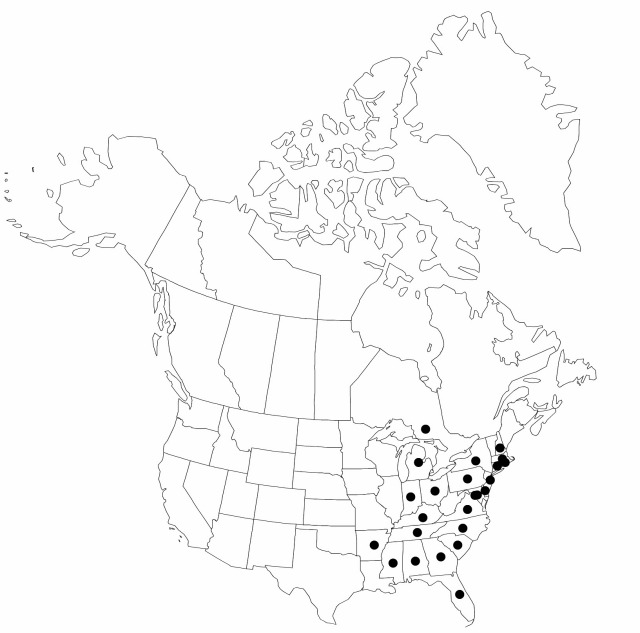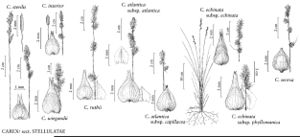Difference between revisions of "Carex seorsa"
in H. C. Gordinier and E. C. Howe, Fl. Rensselaer County N.Y., 39. 1894.
FNA>Volume Importer |
imported>Volume Importer |
||
| (One intermediate revision by the same user not shown) | |||
| Line 1: | Line 1: | ||
{{Treatment/ID | {{Treatment/ID | ||
|accepted_name=Carex seorsa | |accepted_name=Carex seorsa | ||
| − | |accepted_authority= | + | |accepted_authority=Howe |
|publications={{Treatment/Publication | |publications={{Treatment/Publication | ||
|title=in H. C. Gordinier and E. C. Howe, Fl. Rensselaer County N.Y., | |title=in H. C. Gordinier and E. C. Howe, Fl. Rensselaer County N.Y., | ||
|place=39. 1894 | |place=39. 1894 | ||
|year=1894 | |year=1894 | ||
| + | }} | ||
| + | |special_status={{Treatment/ID/Special_status | ||
| + | |code=F | ||
| + | |label=Illustrated | ||
| + | }}{{Treatment/ID/Special_status | ||
| + | |code=E | ||
| + | |label=Endemic | ||
}} | }} | ||
|basionyms= | |basionyms= | ||
| Line 33: | Line 40: | ||
-->{{#Taxon: | -->{{#Taxon: | ||
name=Carex seorsa | name=Carex seorsa | ||
| − | |authority= | + | |authority=Howe |
|rank=species | |rank=species | ||
|parent rank=section | |parent rank=section | ||
| Line 46: | Line 53: | ||
|publication title=in H. C. Gordinier and E. C. Howe, Fl. Rensselaer County N.Y., | |publication title=in H. C. Gordinier and E. C. Howe, Fl. Rensselaer County N.Y., | ||
|publication year=1894 | |publication year=1894 | ||
| − | |special status= | + | |special status=Illustrated;Endemic |
| − | |source xml=https:// | + | |source xml=https://bitbucket.org/aafc-mbb/fna-data-curation/src/2e0870ddd59836b60bcf96646a41e87ea5a5943a/coarse_grained_fna_xml/V23/V23_591.xml |
|genus=Carex | |genus=Carex | ||
|section=Carex sect. Stellulatae | |section=Carex sect. Stellulatae | ||
Latest revision as of 20:41, 5 November 2020
Culms 15–75 cm. Leaves 2–4 per culm; sheaths with inner band hyaline, 3.5–12 cm, apex deeply concave, glabrous; ligules 1.7–7 mm, apex acute or often emarginate; blades plicate to flat, 9–50 cm × 0.8–3.9 mm, widest leaf 2.1–3.9 mm wide. Inflorescences 1.8–7 cm; spikes 4–8; lateral spikes pistillate often with few staminate flowers proximally, 2.8–10.8 mm, sessile, staminate portion (0–)1–6-flowered, (0–)0.8–4.6 mm, pistillate portion 4–25-flowered, 2–7.6 mm; basal 2 spikes 5–27 mm apart; terminal spike gynecadrous, 4.7–16.5 mm, staminate portion 3–13-flowered, 1.8–12.7 × 0.9–2.1 mm, pistillate portion 6–23-flowered, 2.8–7.3 × 4.4–6 mm. Pistillate scales ovate, 1.2–2.2 × 1–1.6 mm, apex acute. Staminate scales ovate, 1.7–3.3 × 1–1.4 mm, apex acute. Anthers 1–1.9 mm. Perigynia spreading to reflexed, green, 6–14-veined abaxially, 0–6-veined adaxially over achene, elliptic to elliptic-ovate, 1.8–2.9 × 1–1.9 mm, 1.2–2.1 times as long as wide; beak 0.2–0.6 mm, 0.09–0.33 length of body, smooth. Achenes ovate to orbiculate, 1.2–1.6 × 0.85–1.4 mm.
Phenology: Fruiting late spring–early summer.
Habitat: Acidic, sandy, peaty hardwood or Chamaecyparis swamps, thickets
Elevation: 0–300 m
Distribution

Ont., Ala., Ark., Conn., Del., D.C., Fla., Ga., Ind., Ky., Md., Mass., Mich., Miss., N.H., N.J., N.Y., N.C., Ohio, Pa., R.I., S.C., Tenn., Va.
Discussion
Carex seorsa very rarely hybridizes with C. atlantica subsp. atlantica.
Carex seorsa is unusual in sect. Stellulatae in its primarily forest understory habitat, lax, spreading habit, perigynia widest in the middle, and smooth perigynia beaks. Its affinities require further study.
Selected References
None.
